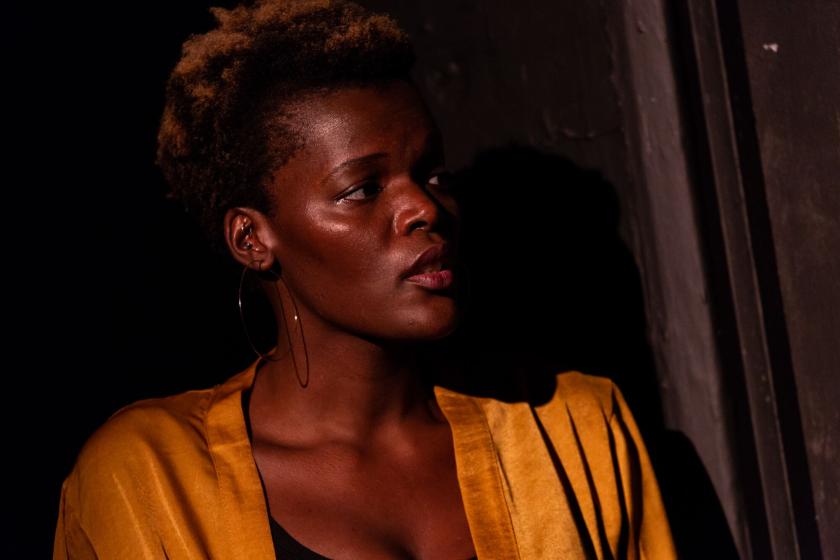Confessions first: I fell asleep mid-way through Time Is Love/Tiempo es Amor, from too much time on trains and planes over the New Year. I was kindly allowed back for a second visit to the Finborough Theatre show, for a Sunday matinee, dosed with coffee and determined to concentrate fully. This was a good thing. The production's name attraction, Olivier Award-winner Sheila Atim, had previously seemed a minor part whereas her masterful performance (must one say mistressful these days?) as Rosa the stripper is a highlight of the piece.
It was also a good thing because the plot of Time is Love is heavily laden. The crime novelist Raymond Chandler, one of the creators of LA noir, a genre to which this piece doffs its hat, would maintain that plots are superfluous to a real story: set up the characters, he’d suggest, see where they go, and when in doubt bring someone into the room with a gun in their hand.
“Man, I got to get out of Los Angeles.” So Serena the sex worker (Sasha Frost) closes the 90 minute drama. Which begs the question, is the play, then, about Los Angeles? And if so, what is it saying? Or is it about Blaz the gangster, his simmering violence, a childhood that ended with his father’s murder? Or Havana, his sultry girl? Or the sex itself that oozes through the show? Or mortality, as expressed in the death of an offstage character Jimmy Rotimi, whose weird name is constantly evoked and who grew fat and died?
Time Is Love was first performed in Los Angeles. I lived there in the 1990s and was occasionally asked to small-scale theatre shows. Unfortunately in Hollywood these productions are really an audition for the movies, for actors striking a pose in a kind of extended screen test hoping to impress a casting director. Time Is Love’s writer and director, the formidable Ché Walker, is well above that game, as the veteran creator of six previous Finborough shows and of the Royal Court play and later Netflix musical Been So Long. The cast also carry some impressive pedigrees; typical of the Finborough to pack a large punch on such a small stage.
 But there remains something of that static Hollywood quality, particularly in the overly stilted performance of Jessica Ledon, as Havana, which needs to anchor the piece. Or maybe it’s the backdrop screen that gives a two-dimensional quality: an impression of standing about and delivering lines. The projection is used to amplify the action; couples dance in sultry circles while a screen behind offers up something steamier.
But there remains something of that static Hollywood quality, particularly in the overly stilted performance of Jessica Ledon, as Havana, which needs to anchor the piece. Or maybe it’s the backdrop screen that gives a two-dimensional quality: an impression of standing about and delivering lines. The projection is used to amplify the action; couples dance in sultry circles while a screen behind offers up something steamier.
The play opens with men circling in the dark with masks and guns and torches; later they appear woth murderous-looking machetesas befits a tale of gangsters in the barrio, hankering for a stretch of home life instead of another stay in prison. We’re in a seamy Latino underworld (there’s a lengthy piece in the programme about the gender-neutral term Latinx, but again it doesn’t quite compute). The pace is sometimes langorous, and the drama a little humourless. There are shades of Shakespearean betrayal, but it’s not clear why we need to care about jailed Blaz (Gabriel Akuwudike) discovering that his Havana has been less than fully loyal, except that it seems likely things won't end well.
The narrator, Serena, sets the scene from a trap-door above the backdrop screen. Frost (pictured above with Akuwudike) is luminous and edgy and lights up the stage whenever she appears, but we lose her for too long before the closing. Atim cuts a nonchalant, haunting, observant figure as Rosa; the star of Girl from the North Country and Othello also wrote the show's nicely staccato score. Both could and should have been cast as leads. Cary Crankson puts in a fine performance as Seamus, the blunt-edged cop.
Akuwudike makes Blaz a brooding man of violent silences, a street gangster thinking of a family; he has great tattoos, with the word "ambition" splashed biker-style across his chest. There are chunks of expressive Spanish dialogue thrown in here and there. In Los Angeles it may give a bilingual verisimilitude, but in London the same approach disenfranchises; if the language matters, and it seems to, we need to know what it means.
- More theatre reviews on theartsdesk
- Time Is Love/Tiempo is Amor at the Finborough Theatre until 26 January















Add comment